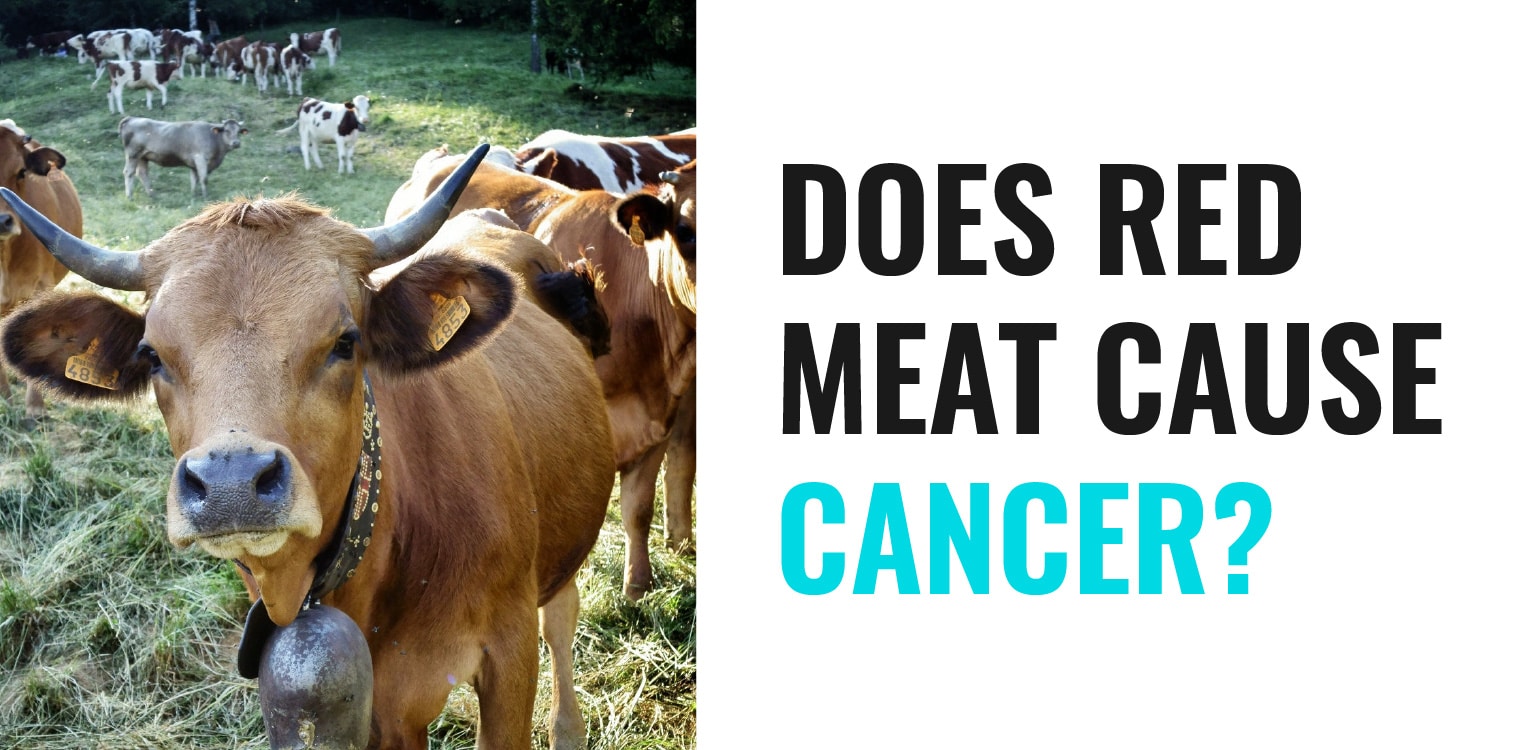I am an evidence-based nutritionist and I am also vegan. This puts me in the intersection of both these groups which is not a good place to be in. This is because veganism and nutrition research never seem to agree with each other when questioned – does red meat cause cancer? Vegans say it does while research is still undecided.
Ethically speaking, I am against consuming animal products, including red meat. But to remain objective, I am addressing this topic from a nutrition perspective.
The Difference Between Processed and Red Meat
It’s a common mistake to group red meat and processed meat together when reading about the cause of cancer. To prevent any ambiguity, here are the World Health Organization’s (WHO) definitions of red meat and processed meat.
Processed Meat
“Processed meat refers to meat that has been transformed through salting, curing, fermentation, smoking, or other processes to enhance flavor or improve preservation. Most processed meats contain pork or beef, but processed meats may also contain other red meats, poultry, offal, or meat by-products such as blood.”
Red Meat
“Red meat refers to all mammalian muscle meat, including, beef, veal, pork, lamb, mutton, horse, and goat.”
The IARC Classification of Carcinogens
The International Agency for Research on Cancer (IARC) is a part of the WHO. It researches carcinogens and classifies them into groups. Its analysis was last updated in 2015 after considering more than 800 studies on cancer in humans. The panel consisted of 22 experts from 10 countries. Here is a simplified version of the classification. For a comprehensive understanding, please read the IARC Preamble.
- Group 1 – The substance causes cancer
- Group 2A – The substance probably causes cancer. This classification is given if it at least causes cancer in human cells. It should also either cause cancer in animals or show carcinogenic properties.
- Group 2B – The substance possibly causes cancer in humans. A substance is given this classification if it at least causes cancer in animals and there is reason to believe that the same might apply to humans.
- Group 3 – Substances that do not fall into any other group are placed in this category. This does not mean that it does not cause cancer. It simply means that there is no robust evidence to say it causes cancer.
Does Processed Meat Cause Cancer?
Processed meat has been classified as a Group 1 Carcinogen as there is enough evidence to show that it causes cancer. This group also contains tobacco.
Are tobacco and processed meat equally carcinogenic?
No. The IARC only tells us the likelihood of the substance causing cancer based on the scientific evidence. We can say that both, tobacco and processed meat, cause cancer because there is strong scientific evidence to show that.
The IARC does not tell us how carcinogenic a substance is. Let’s say we have 2 people – one eats sausages and fried bacon daily and the other smokes 6 cigarettes a day. We can say that both people may get cancer. We can’t say that sausages and fried bacon are as carcinogenic as smoking 6 cigarettes a day. Here’s why –
Red meat and processed meat don’t cause as much cancer as tobacco
After crunching the world’s cancer statistics using advanced mathematical equations, I found out that tobacco mostly causes lung cancer while red and processed meat cause bowel cancer. Kidding, I just used this really nice infographic from Cancer Research UK’s website to get the stats. Clearly tobacco causes a lot more cancer than red and processed meat.

Credit: Cancer Research UK
The Dose Makes the Poison
Everything, even the harmless aloe vera, has the potential to cause cancer. However, paraphrasing the 15th century physician Paracelsus, the dose makes the poison. So, a person who eats processed meat once a week does not carry the same risk of developing bowel cancer as a person who eats it several times a week.
Tobacco is Addicting
Tobacco contains the addictive stimulant nicotine while processed meat does not. Hypothetically, this might make cigarettes more addicting than processed meat. If true, the likelihood of smoking multiple cigarettes is more than the likelihood of eating several servings of processed meat.
Kabir Singh has Better Genetics than Zaheer
Individual factors such as genetics also play a role in the development of cancer. You might have come across examples such as Kabir Singh who smoke, drink, and lead terrible lifestyles. This might lead you to believe that they desire cancer and not the movie’s actress. Yet, they don’t develop cancer, live a long life, and die smoking a cigarette in their deathbeds (’cause masculinity).


Shahid Kapoor as Kabir Singh (left) smoking 2 cigarettes in the movie Kabir Singh. Jimmy Shergill as Zaheer (right) in the movie Munnabhai MBBS
Then there are people like Zaheer from Munnabhai MBBS who develop cancer despite never drinking or smoking.
Kabir Singh, along with a broken heart, may also have favorable genetics which reduces his risk of developing cancer. Zaheer did not have the same genetic gifts. Because of this he dies of cancer.
Claiming that processed meat is as carcinogenic as tobacco is like saying that the probability of dying while flying in an airplane is as the same as the possibility of dying while travelling in a car. Can they both kill you? Yes. But the probability of dying in a car crash is a lot greater than the probability of dying in a plane crash.
Does Red Meat Cause Bowel Cancer?
Red meat is under Group 2A which includes substances that can probably cause cancer in humans. The data suggests that eating red meat is positively correlated with bowel cancer. Is it possible that red meat causes bowel cancer? Yes. But since the evidence is limited, it’s also possible that it doesn’t, and that the positive correlation can be explained by other factors such as bias or confounding.
How Much Meat Can You Eat?
Based on the IARC’s classification, many guidelines recommend limiting red and processed meat intake to 70 to 90g per day. However, there’s a caveat to the IARC’s 2015 classification – most of the studies used for their analysis were conducted in the 1990s or earlier.
A study published earlier this year points that we don’t eat the way we ate in the 1990s. After considering current dietary patterns, the study found that even when people ate 76g of red and processed meat per day, it increased their risk for bowel cancer by 20% when compared to people who ate only 21g. Notice that 76g falls within the current IARC recommendations.
This study is important as it was conducted in over 175,000 British men and women between 2006-10. Therefore, the safe limits of red and processed meat consumption could lie between 20 to 70g per day.
Conclusion
The epidemiology of cancer is complex. Scientists are still struggling to understand what causes it.
Processed meat is certainly carcinogenic. But how carcinogenic? We do not know. The WHO recommends that people should moderate the consumption of processed meat to reduce the risk of bowel cancer. However, processed meat has no health benefits and it is carcinogenic. Therefore, avoid processed meat, especially if you are concerned about bowel cancer.
We still cannot say if red meat causes bowel cancer. However, there is a positive correlation between them. Just to be safe, you might want to limit your red meat intake to less than 70g per day until more research emerges.
P.S. – While red meat may or may not give you cancer, not eating it will certainly save a lot of animals from being killed for food.





5 Responses
In this regards i can give some inputs. We have medical tourism collaboration with Bangladesh. Almost 60-70% Bangladeshi patients we handle regularly who comes with digestion problem and also infertility and pressure problem.Liver expanse,fatty liver are very common in them. Consultant with drs and also my self Enquiries and study show that basically huge red meat intaking and uses of huge chilli mostly dry chilli are the cause of liver and infertility problems of them. Bangladeshees are too high intaking people of red meat mostly cow.96% of indian cow flesh exports there..coming to wholstic management we control there diet mostly red meat, increase herbs use and exercise also..But we get cancer very few in no.
It is my experience which i shared
Thank you for your comments Anindita! I’d say that it might be prudent to limit red meat intake based on the studies I have red and your experience also seems to point in the same direction.
Comments are closed.